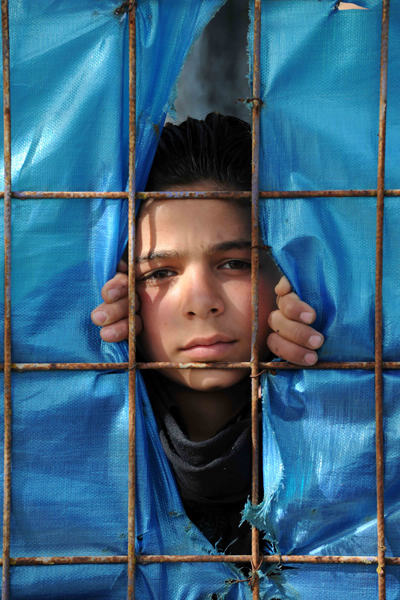|
 |
|
LOOKING FOR HOPE: A Syrian child in a refugee camp near the Syrian-Turkish border. More than 37,000 Syrian refugees have poured into neighboring Turkey since violence broke out in Syria a year ago (MA YAN) |

On April 11, one day before the deadline set by international mediator Kofi Annan, the Syrian Government announced it would halt its military operations on armed opposition groups. Annan, the joint envoy of the UN and the Arab League for Syria, said he received an official letter for the truce. The ceasefire went into effect as of 6 a.m. local time the next morning. To solidify the progress, the UN Security Council unanimously adopted a resolution on April 14, authorizing the deployment of an advance team of unarmed military observers to monitor the truce between Syrian government forces and armed opposition fighters.
Presently, what concerns the international community most is how long the ceasefire can last. Due to the temporary needs of all parties, the ceasefire might be kept in the short term, but in the long run, the political situation in Syria is still uncertain.
The current Syrian truce is a result of Annan's six-point plan on ending Syrian violence. Therefore, how the peace plan is implemented is a critical factor for the future peace of the country.
Since the Syrian turmoil began in March last year, there have been acute differences on the issue among the international community. On February 23 this year, the UN Security Council appointed former UN Secretary General Kofi Annan as the UN-Arab League joint special envoy to seek a peaceful settlement of the Syrian crisis. The appointment showed the international community wanted to explore new ways of addressing the Syrian crisis.
After receiving the mission, Annan said the crisis should be settled only by political dialogue, and foreign military intervention would worsen the current situation. He urged the Syrian Government and opposition parties to value the will of the Syrian people and try to work together for a peaceful solution.
After exchanging views with the Syrian Government and opposition, as well as other nations concerned, Annan put forward the six-point peace plan in mid-March. The key point of the plan lies in the Syrian Government's ceasefire with opposition groups. While avoiding mentioning a regime change, the plan opposes foreign intervention and stresses that the future of Syria is up to the Syrian people. It has therefore gained wide support of the international community. The UN Security Council has released two official statements to offer its support.
The current Syrian ceasefire might last for some time. The ceasefire and the peace plan are not only supported by the international community, but also welcomed by the Syrian people. Neither the Syrian Government nor the opposition can publicly go against the popular will and destroy the peace at the moment. Also, after being severely stricken by government forces, the opposition needs time for rehabilitation. In addition, the deployment of a UN observer mission will be helpful to maintain the ceasefire. With the ceasefire in place, the opposition has begun to take other resistance actions. It has called on the people to take part in anti-government protests to test the Syrian Government's sincerity in applying Annan's truce deal.
Though both the international community and Syrian people hope the ceasefire could be a turning point in the Syrian crisis, the current truce might not bring enduring peace in Syria. In the future, conflicts and violence could possibly re-emerge.
| 